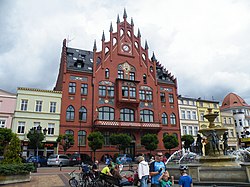Chojnice
| Chojnice | |||
|---|---|---|---|

Historical town hall located on Market Square
|
|||
|
|||
| Coordinates: 53°42′N 17°33′E / 53.700°N 17.550°E | |||
| Country | Poland | ||
| Voivodeship | Pomeranian | ||
| County | Chojnice County | ||
| Gmina | Chojnice (urban gmina) | ||
| Established | 11th century | ||
| Town rights | 1325 | ||
| Government | |||
| • Mayor | Arseniusz Finster | ||
| Area | |||
| • Total | 21.05 km2 (8.13 sq mi) | ||
| Population (2011) | |||
| • Total | 40,447 | ||
| Time zone | CET (UTC+1) | ||
| • Summer (DST) | CEST (UTC+2) | ||
| Postal code | 89-600, 89-604, 89-620 | ||
| Area code(s) | +48 52 | ||
| Car plates | GCH | ||
| Website | http://www.miasto.chojnice.pl | ||
Chojnice [xɔjˈɲit͡sɛ] (Kashubian/Pomeranian: Chònice, German: Konitz) is a town in northern Poland with approximately 40 447 inhabitants (2011), near the famous Tuchola Forest and many other natural reservoirs. It is the capital of the Chojnice County.
Chojnice has been a part of Pomeranian Voivodeship since 1999, as it was during the period 1945–1975; during the time span 1975–1998 the town belonged to Bydgoszcz Voivodeship.
Chojnice was founded around 1205 (although the date is considered to be estimate) in Gdańsk Pomerania (Pomeralia), a duchy ruled at the time by the Samborides, who had originally been appointed governors of the province by Bolesław III Wrymouth of Poland. Gdańsk Pomerania had been part of Poland since the 10th century, with few episodes of autonomy, yet under Swietopelk II, who came into power in 1217, it gained independence in 1227. The duchy extended roughly from the river Vistula in the east, to the rivers Łeba or Grabowa in the west, and from the rivers Noteć and Brda in the south-west and south, to the Baltic Sea in the north. By 1282 the duchy had returned to Poland.
The town's name is Polish in origin and comes from the name of the river Chojnica (today named Jarcewska Struga) that was located near the town. The name first appears in written documents in 1275.
In 1309 the Teutonic Knights took over the town, and Chojnice became part of the State of the Teutonic Order. Under Winrich von Kniprode the defense capabilities and inner structures of the town were improved considerably. Around the middle of the 14th century the stone church of St. John was built. At the same time the Augustinians from the town of Stargard in Pomerania settled here; they opened their monastery in 1365. In the same century textile production flourished in the town. Between 1417-1436 Konitz became an important centre for textile production.
...
Wikipedia



